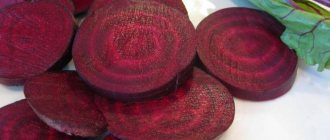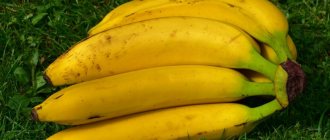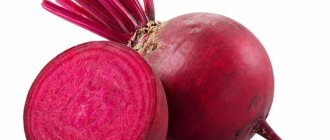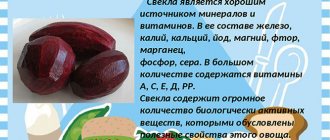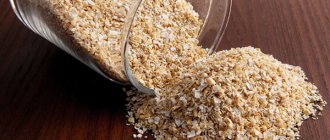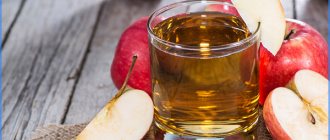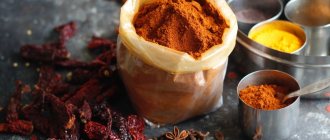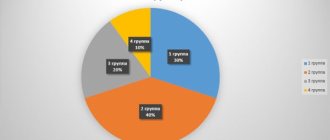Nutritionists constantly talk about the need to include vegetables in your diet every day. One of the leaders in value is beets. This red root vegetable is famous for improving the composition of human blood, giving strength and helping to overcome vitamin deficiency in winter. Let's look at what vitamins are contained in beets and why they are so valued.
The Far East is considered the vegetable’s birthplace, where they noticed its positive effects on health and began to cultivate wild varieties. On the territory of Kievan Rus, the root crop was grown back in the 10th century. According to surviving chronicles, the Eastern Slavs believed that eating beets helped them avoid the plague that was raging in Western Europe. The use of vegetables to treat diseases is mentioned in the writings of Hippocrates.
Chemical composition of the root vegetable
If you spend more time on chem. composition of beets, it immediately becomes clear that it contains a large amount of carbohydrates (monosaccharides and disaccharides - 11 g). The protein will be much less - 1.9 g. The beet root contains 14% carbohydrates, with the most sucrose (about 6%), but much less glucose and fructose. Below is a list of the chemical composition of beets.
- Vitamin C.
- Vitamin B12.
- Vitamin RR.
- Vitamin B2.
- Carotene.
- Vitamin B3.
- Vitamin B5.
- Vitamin B6.
- Vitamin R.
- Vitamin U
- Mineral salts.
- Pectin substances.
- Carbohydrates.
- Apple acid.
- Cellulose.
- Tartaric acid – sucrose
- Proteins;
- Oxalic acid.
More information about the chemical composition of raw beets, as well as its benefits, can be found here.
Does it thin the blood or thicken it?
If clotting is impaired, the root vegetable will be a life-saving find. It thins the blood, so clotting is reduced. The vegetable is enriched with calcium and pectin components, which are important for the metabolic process of coagulation. Thanks to it, the likelihood of the formation of blood clots and plaques is reduced, and fat fractions accumulate less.
It is important to know! Nutritionists say that beets are useful for people with varicose veins and a tendency to form blood clots. Sodium and calcium in it are in the optimal ratio.
Calories and nutritional value
Let's consider the calorie content and nutritional value of red raw (fresh) beets per 100 gram serving:
- calories – 40 kcal;
- proteins – 1.6 g;
- fats – 1.5 g;
- carbohydrates – 8.8 g;
- dietary fiber – 2.5 g;
- water – 86 g.
The root vegetable contains quite a lot of sugar . As a result, the question arises: how many calories, proteins, fats and carbohydrates are contained in 1 medium beet, but we will consider these indicators per 100 grams of raw, canned or boiled vegetable.
Attention. Boiled beets (100 grams) – 50 kcal. Why is that? When treated with temperature, substances change their properties. In addition, boiled beets contain fewer nutrients than raw ones.
How many kcal are in one canned beetroot? The calorie content of canned beets is 31 kcal per 100 g of product .
It contains:
- 0.9 g – protein;
- 0.1 g – fat;
- 5.4 g – carbohydrates.
Let's consider how many kilocalories and the composition of BZHU in pickled vegetables. Pickled beets contain 1 g of protein, 0.05 g of fat and almost 8 g of carbohydrates. Calorie content is 36.92 kcal.
As a percentage:
- 16% – proteins;
- 17% – fats;
- 67% – carbohydrates.
BJU content in steamed beets (100 grams):
- 1.52 g – protein;
- 0.13 g – fat;
- 8.63 g – carbohydrates.
The calorie content of steamed beets is 42.66 kcal.
Effect on hemoglobin
First of all, beets are valued for their active participation in hematopoietic function. Due to its high iron and copper content , the vegetable is indispensable for blood renewal. It is also significant for hemoglobin levels.
In addition to iron, beet pulp contains a lot of vitamin B9, which prevents anemia and even prevents leukemia. Particularly effective for anemia:
- pickled beets;
- beet juice
It is also recommended to mix beet juice with freshly squeezed carrot juice.
Researchers and doctors also made a very interesting discovery: they discovered that beet protein is half similar in structure to hemoglobin in human blood. Research is currently underway into the possibility of converting a beet protein compound into a human blood substitute.
Beets also thin the blood, preventing blood clots.
Vitamins
The benefits of beets have long been known to everyone. A large number of medicinal properties are contained in the root of the plant and in the leaves. Beets are a vitamin product. Let's look at what vitamins are in raw red beets and how much they contain.
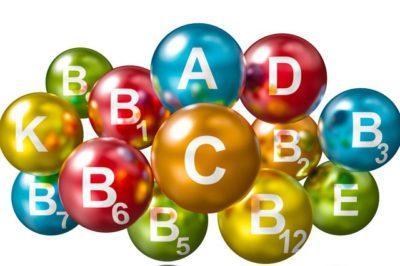
Vitamin content:
- Vitamin A – 0.002 mg.
- Vitamin B3 – 0.4 mg.
- Vitamin B9 – 0.013 mg.
- Vitamin B1 – 0.02 mg.
- Vitamin B5 – 0.1 mg.
- Vitamin C – 10 mg.
- Vitamin B2 – 0.04 mg.
- Vitamin B6 – 0.07 mg.
- Vitamin E – 0.1 mg.
Also, the beneficial properties are due to the content of trace elements and minerals:
- copper;
- iodine;
- boron;
- gland;
- manganese;
- cobalt;
- vanadium;
- fluorine;
- molybdenum;
- rubidium;
- zinc
Iodine helps people suffering from goiter, atherosclerosis and obesity. And chlorine, which is also contained in this plant, has a cleansing effect on the liver, kidneys and gall bladder.
Features of use during pregnancy
As a rule, women tolerate beetroot dishes well during pregnancy. Doctors recommend eating vegetables often because:
- it is enriched with various vitamins, minerals and carotenoids, pectins and organic acids, which ensure a good pregnancy and normal fetal development;
- helps cope with constipation and prevents its formation;
- can be used for microenemas;
- it lowers blood pressure, which often rises in the 7-9 months of pregnancy;
- allows you to maintain normal hemoglobin levels and prevent the development of fetal hypoxia.
Benefit
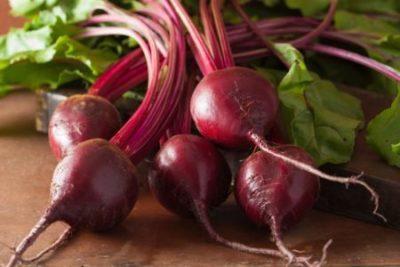
Beets are famous not only for their calorie content, but also for their benefits to the body. This product is in the public domain, and therefore many people use it in medicinal form. After all, beets treat cardiovascular diseases, atherosclerosis, liver diseases, and also help in the fight against excess weight.
It is often used for chronic constipation. Fiber strengthens intestinal function, and amino acids help with cell degeneration. Beetroot juice is good for blood problems. And beets are also useful for a very young body. It can be used as a laxative to normalize stool, but the main thing here is not to overdo it.
Experts say that during menstruation, a woman should only consume boiled root vegetables (you can find out the benefits and harms of beets for a woman’s body here). Beets will help restore blood loss and increase hemoglobin. The plant has a cosmetic effect and is used in folk medicine to treat the skin.
Improves the condition of the skin and gives freshness to the body. No matter how strange it may sound, amino acids really fight early aging. You can delay your retirement a little.
Read in detail about which beets are healthier for the body - boiled or raw, and from this article you will learn what the benefits and harms of consuming them are for human health.
Beet juice
Fresh beet juice also has beneficial qualities. It contains vitamins and many useful elements, so it is recommended to drink it to improve the body’s protective functions, improve the functioning of the intestines and stomach, and also as a prophylactic to prevent many colds, hypertension, bronchitis, anemia, and pneumonia.
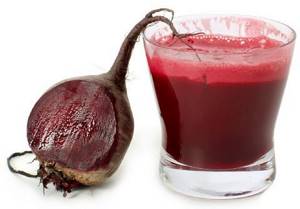
The juice contains many useful substances, so you should be careful when consuming it. It is better to drink beet juice before meals, mixing it with other vegetable juices. In order not to cause harm to the body, you should start drinking it with small portions.
Contraindications and harm
- Cannot be used if you have diabetes.
- For chronic diarrhea.
- Beets interfere with calcium absorption.
- It is not recommended to use it for urolithiasis, because the plant contains oxalic acid.
- The cleansing effect of beets is so pronounced that it flushes out not only toxins, but also calcium.
- It is prohibited to be consumed by people with diseases of the gastrointestinal tract (gastritis, ulcers). Beets are acidic and irritate the digestive system.
- Taking in large quantities causes spasm of blood vessels. Therefore, if people have chronic migraines, they should use it with caution.
- It has a bad effect on the health of hypotensive patients. Beets lower blood pressure.
In conclusion, I would like to note once again that despite the contraindications, beets remain a useful product that is rich in various substances, primarily proteins and carbohydrates. You need to eat it, you just need to take into account the state of your health. Whether you need to know how many calories or what microelements are contained in one fresh beet, let everyone decide for themselves. The main thing is not to overdo it in food! Especially if beets are used in preparing dishes for children.
Beets have been one of the popular vegetables in Russian cuisine for several centuries. How much and in what form it is better to eat this root vegetable, as well as about its beneficial properties for the male body - read on our website.
Beneficial properties of beets
- Beets bring invaluable benefits to people suffering from chronic constipation . The roots of this plant are rich in fiber, organic acids and other substances that enhance gastrointestinal motility, regulate metabolic processes, stimulate the secretion of digestive enzymes and sanitize the intestines. Beetroot juice is a natural antiseptic that effectively destroys pathogenic intestinal and gastric microflora. In general, the inclusion of dishes prepared from this vegetable in the diet can significantly improve the functioning of the digestive tract.
- Beetroot juice is a truly effective remedy for a runny nose . In order to get rid of all manifestations of rhinitis, it is enough to instill this herbal medicine into the nasal passages instead of nasal drops.
- Beets are a rich source of natural antioxidants . Eating this root vegetable allows you to minimize the risk of tumor tumors (breast cancer in women, colorectal cancer in both sexes) and slow down the process of metastases in cancer.
- Betaine and other compounds contained in beet juice increase the body's physical endurance and help it recover faster after sports, hard work, and protracted illnesses.
- The pulp of the plant's roots is an excellent hepatoprotective agent . The substances present in its composition promote the renewal and restoration of liver cells and prevent fatty infiltration of the tissues of this organ.
- Ascorbic acid, flavonoids and vitamin F, present in beet juice, improve the functioning of the visual system and prevent the development of ophthalmological diseases.
- The substances that make up beets normalize lipid metabolism in the body and prevent the accumulation of excess weight. Dishes made from it are the most important component of weight loss diets.
- The beneficial compounds this root vegetable is rich in have a beneficial effect on the functioning of the respiratory system. Eating dishes made from it can prevent the development of asthma or significantly increase the time intervals between attacks of this disease.
- Substances present in beets help remove homocysteine from the body, a non-proteinogenic amino acid that negatively affects the condition of blood vessels and increases the risk of developing cardiac diseases. Regular inclusion of this vegetable in the diet helps prevent the occurrence of atherosclerosis, Alzheimer's disease, hypertension and thrombosis.
- Beetroot juice contains substances that increase potency in men and improve the composition of ejaculate. It has been proven that regular consumption of beetroot dishes helps reduce the risk of developing prostate adenoma and male infertility.
- Many beneficial substances present in beets take part in the production of hormones. Including dishes from this vegetable in your diet helps prevent the development of a wide range of hormonal disorders.
- Beets help cleanse the body, effectively removing excess cholesterol, waste, toxins, heavy metals and other harmful substances. In addition, the compounds included in its composition significantly weaken the negative effect of poisons on the tissues of the human body.
- Iron, B vitamins and cobalt present in beet juice improve the functioning of the hematopoietic system and help avoid the development of anemia.
- Beetroot is an indispensable component of the diet of pregnant women. Including this root vegetable in the daily menu of the expectant mother helps to provide the baby with useful macro- and microelements, vitamins, reduce the risk of developing birth defects and rickets, and create conditions for the normal formation of his nervous system.
- It has been proven that beet juice has a beneficial effect on the female reproductive system . This drink weakens the manifestations of premenstrual syndrome, eliminates the symptoms of menopause, reduces discomfort during painful menstruation, and normalizes the cycle.
- Beets are a rich plant source of iodine. Regular inclusion of this product in the diet allows you to fully satisfy the body's need for this useful microelement, and avoid the development of iodine deficiency conditions and accompanying pathologies (for example, thyroid diseases).
- Beetroot juice has an anti-inflammatory effect. The pulp of the root vegetable and the juice obtained from the leaves of the plant are used to prepare compresses that accelerate wound healing.
- The beneficial substances present in beet juice have a positive effect on the activity of the central nervous system. With this drink you can minimize the negative effects of stress on the body, get rid of depression and sudden mood swings, and improve sleep.
- Beetroot is an effective remedy for strengthening the immune system. Regular inclusion in the diet of dishes prepared on the basis of this vegetable allows you to avoid seasonal vitamin deficiency and increase the body's resistance to bacterial and viral infections.
Interesting Facts
In Ancient Greece, red beets were mentioned in the scientific works of Hippocrates as a medicine (tops and leaves) for many diseases. It is interesting that the healing benefits of beets for the body over time turned the root vegetable into a symbol of well-being, and the Greeks, when welcoming high-ranking guests, decorated tables with it.
Beetroot has been known in Rus' for a long time. The first mention of this root vegetable dates back to the beginning of the 11th century, and already in the 14th century the vegetable was cultivated. It is interesting that the baked vegetable was served to guests for tea, and Russian heroes took it with them on campaigns, believing that this decoction of the product gave courage and strength in battles. In the 18th century, the first variety of sugar beet was developed, and sugar factories began to be created in Russia, and farmers began to sow fields with this root crop. A little later, doctors discovered the wonderful healing properties that the tops of the plant carry, the importance of the root vegetable for weight loss, and its excellent properties in healing the liver.
Red beets were immediately divided into fodder and food. Moreover, the root crop was grown in Germany for livestock feed, and the vegetable was consumed as food in the Balkans, during the next outbreak of plague in Europe.
Bottom line
Having discovered reduced hemoglobin, there is no need to despair and immediately buy pills. In most cases, it can be cured by adjusting the diet and adding foods that increase hemoglobin. As practice shows, following a diet gives good lasting results.
You need to lead a healthy lifestyle, give up bad habits, try to be less nervous, spend more time in the fresh air, and practice adequate physical activity. By following simple recommendations, you will no longer have problems with hemoglobin.
